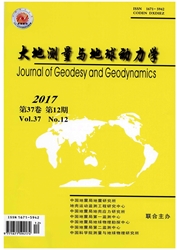

 中文摘要:
中文摘要:
针对GPS星载原子钟噪声特点,利用顾及随机噪声类型的卡尔曼滤波进行GPS在轨卫星钟差估计与预报精度分析,定量揭示了不同类型星载原子钟间的精度差异,同时结合卫星钟稳定性分析,得出Block IIR—M Rb钟稳定性和精度优于Block IIR Rb钟,而Block IIR Rb钟稳定性和精度优于Block IIA Rb钟;Cs钟的精度和稳定性比其他类型Rb钟低2~3倍。另外,该滤波算法用于卫星钟差短期预报也具有一定的优越性,Rb钟预报1天的平均中误差为1.9ns,优于常规的最小二乘预报算法。
 英文摘要:
英文摘要:
Through the analysis of GPS satellite clock noise and the research on estimation and prediction of satellite clock error by Kahnan filter the differences of accuracy among different style of clock are quantitatively revealed. Meanwhile, combined with satellite clock stability, follow conclusions can be drawn. The stability and precision of GPS Block IIR - M Rb clock is better than those of Block IIR Rb clock and stability and precision of GPS Block IIR Rb clock is better than that of Block IIA Rb clock. Compared with Rb clock, Cs clock's stability and precision is worse by 2 - 3 times. Thus, some suggestion can be offered as follows. Real time state monitoring of satellite atomic clock and clock error estimation can be achieved by Kalman filter considering stochastic model of satellite clock noise, and Kalman filter has some advantages in short time prediction of satellite clock error, average prediction RMS of Rb clock is 1.90 ns, which is superior to least square algorithms.
 同期刊论文项目
同期刊论文项目
 同项目期刊论文
同项目期刊论文
 期刊信息
期刊信息
